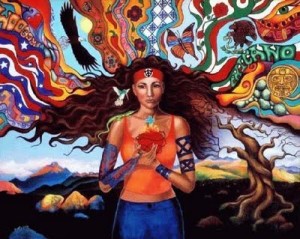I decided to do my project on Chicana feminism because it is a rich subject that has had a lot of light shed on it throughout this course. A lot of the characters we have met in readings have been Chicana women who face hardship in regards to social oppression, challenges to gain identity/gender identity, racism, sexism, and more. In fact, Chicana literature is a vital aspect of the Chicana femenism, also known as “Xicanisma”, movement as it allows women to share their experiences and projects their voices in an intellectual, creative, and expressive way.
A Chicana is a Mexican-American woman who faces the threat of being treated as a minority in her own homeland while struggling to establish her own identity and voice within her most intimate community. The status of an outcast also applies to the gothic aspect of this course as well. She embodies the clash of her Mexican roots and her parallel American culture as she identifies her inequalities, most commonly related to gender inequalities, within both of these societies. Nicole Thompson of Xicanisma: The Chicana Feminist & Her Movement from the Latin Post states, “ Chicana feminists made it known that they did not want to be pigeonholed into stereotypical roles such as child-bearers, homemakers and caregivers. Nor, did they want to continue to suffer mistreatment at the hands of domineering fathers, brothers or husbands.” A lot of the hardships that Chicana women face lies in gender inequality and the affects of stereotyping the female gender. Much of the movements of Chicana feminism works to create a role for women that empowers and celebrates them.
Sources:
“Xicanisma: The Chicana Feminist & Her Movement.” Latin Post RSS. N.p., n.d. Web. 27 Apr. 2014.


I love your first line of the post, “A Chicana is a Mexican-American woman who faces the threat of being treated as a minority in her own homeland while struggling to establish her own identity and voice within her most intimate community.” I feel that is a great definition and outlook on what it means to be a Chicana or a Chicano. So often, Chican@s/Mexicans are seen as “foreign,” when they are not. The concept of the Southwest being a homeland/Aztlan is counterhegemonic to this belief. In addition, the concept of being a “minority,” or a “sub-group” has been challenged. Alicia Gaspar de Alba refers to Chican@s as an “Alter-Native” group, being an alternative group (to the dominant society) with origins in this native region. I believe this term is great in depicting Chican@ narrative as an alternative view or group, without being “below” or being viewed as an exoticized Other (108).